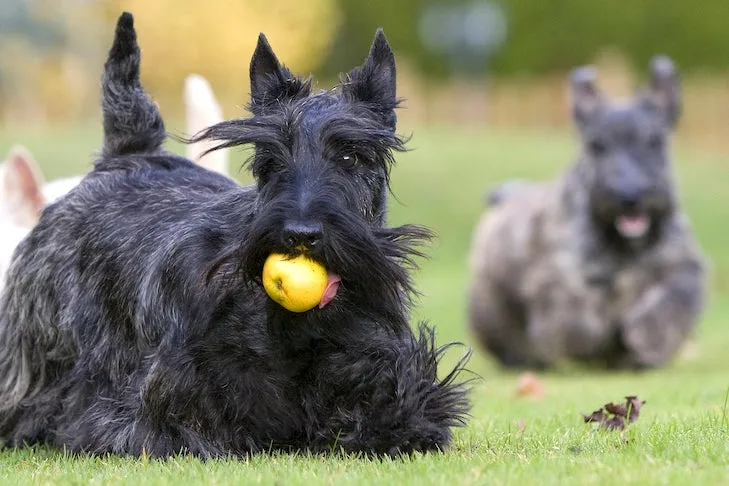It’s natural to want to share your favorite snacks with your canine companions, assuming that if it’s good for you, it’s good for them too. However, this isn’t always the case. While many human foods are safe for dogs, some can be unhealthy or even dangerous. Understanding which fruits dogs should not eat is crucial for their well-being. Dogs have a different digestive system than humans, and consuming the wrong foods can lead to serious health issues, and in severe instances, be fatal. As omnivores, dogs don’t strictly need fruits or vegetables in their diet, but offering them safe options as occasional treats can be a delightful addition.
This guide will delve into fruits that are safe for dogs to enjoy in moderation and, importantly, highlight the fruits that pose a risk and should be avoided.
Fruits Dogs Should Absolutely Avoid
While many fruits offer fantastic health benefits to humans, some contain compounds, seeds, or parts that are toxic to dogs. It’s essential to keep these fruits out of your dog’s reach to ensure their safety.
Avocado
Avocado might be a healthy choice for us, but it’s best not to share it with your dog. The pit, skin, and leaves of avocados contain a toxin called persin, which can cause vomiting and diarrhea in dogs. Even the flesh, though containing less persin, can still be too much for a dog’s system. Furthermore, avocado flesh is high in fat, which can lead to gastrointestinal upset or even contribute to conditions like pancreatitis if consumed in excess. Thankfully, you can find dog treats for skin and coat health that include avocado in their ingredients, offering the benefits without the risk.
Cherries
With the exception of the fleshy fruit surrounding the pit, the cherry plant contains cyanide, making it toxic to dogs. Cyanide interferes with cellular oxygen transport, meaning a dog’s blood cells struggle to receive adequate oxygen. If you have a cherry tree, ensure your dog cannot access fallen fruit. Ingesting cherries whole or their pits can lead to symptoms like dilated pupils, difficulty breathing, and red gums, which are signs of cyanide poisoning and require immediate veterinary attention. When enjoying cherries yourself, always secure discarded pits in a dog-proof trash can to prevent accidental ingestion. If you want to offer your dog the antioxidant benefits of cherries safely, consider cherry-flavored dog treats.
Grapes and Raisins
If you suspect your dog has eaten grapes or raisins, contact your veterinarian immediately. Grapes and raisins are highly toxic to dogs, regardless of their breed, sex, or age. They are so dangerous that they can lead to acute kidney failure. Always be vigilant about these fruits, especially if children in your household consume them. Ensure that any discarded grapes or raisins are disposed of in a secure, dog-proof trash receptacle, not in compost heaps accessible to your pet.
Tomatoes
While the ripe flesh of a tomato is generally safe for dogs, the green parts of the tomato plant contain a toxic substance called solanine. A dog would need to consume a significant amount of the plant to become ill, but it’s safer to avoid feeding tomatoes altogether. If your dog has a habit of exploring your garden, make sure your tomato plants are inaccessible.
 ©everydoghasastory – stock.adobe.com
©everydoghasastory – stock.adobe.com
Fruits Dogs Can Eat (In Moderation)
Many fruits can serve as delicious and healthy occasional treats for dogs, offering essential vitamins, minerals, and antioxidants. Always introduce new foods slowly and in small quantities.
Apples
Apples are a fantastic source of vitamins A and C, along with dietary fiber. They are low in protein and fat, making them an ideal snack, especially for senior dogs. Remember to remove the seeds and core before offering them. For a refreshing treat, try freezing apple slices. You can also find them as an ingredient in many apple-flavored dog treats.
 Scottish Terriers playing in the grass. ©CallallooFred – stock.adobe.com
Scottish Terriers playing in the grass. ©CallallooFred – stock.adobe.com
Bananas
In moderation, bananas make a great low-calorie treat. They are rich in potassium, vitamins, biotin, fiber, and copper, while being low in cholesterol and sodium. Due to their sugar content, they should be given as an occasional treat rather than a dietary staple. You can also find convenient banana dog treats that stay fresh longer.
Blueberries
Blueberries are a superfood packed with antioxidants that protect cells from damage. They also provide fiber and phytochemicals. If you’re teaching your dog to catch treats, blueberries are a fantastic and healthy option. They are also a popular ingredient in blueberry dog treats, often combined with other beneficial ingredients like yogurt.
Cantaloupe
Cantaloupe is nutrient-dense, low in calories, and an excellent source of hydration and fiber. However, it is high in sugar, so it should be given in moderation, particularly for dogs who are overweight or have diabetes. Frozen cantaloupe balls or cubes can be a refreshing summertime snack.
Cranberries
Both fresh and dried cranberries can be safely given to dogs in small amounts. Be mindful that many dried cranberries sold for human consumption are sweetened, adding unnecessary sugar to your dog’s diet. Opt for unsweetened fresh or frozen cranberries, or look for crunchy cranberry dog treats. Excessive cranberry consumption can lead to an upset stomach.
Cucumbers
Cucumbers are particularly beneficial for overweight dogs as they are virtually free of carbohydrates and fat, and provide ample hydration. They contain vitamins K, C, and B1, along with potassium, copper, magnesium, and biotin. Slices of cucumber can be a cooling treat on a hot day, and freezing them can create an engaging enrichment snack.
 Dog cucumber ©Sonja – stock.adobe.com
Dog cucumber ©Sonja – stock.adobe.com
Mango
This sweet, tropical fruit is brimming with vitamins A, B6, C, and E, as well as potassium and carotenoids. Remember to remove the hard pit, as it contains small amounts of cyanide and poses a choking hazard. Due to its high sugar content, mango should be offered as an occasional treat, especially for dogs managing their weight. For a less messy option, consider chewy mango dog treats.
Oranges
Oranges are safe for dogs in small quantities. They are an excellent source of vitamin C, potassium, and fiber. However, many dogs are deterred by the strong citrus scent and taste. It’s recommended to offer only the flesh, discarding the peel and seeds, as the peel can be harsh on their digestive system and the oils can be off-putting. If your dog isn’t fond of fresh citrus, explore dog treats with oranges.
Peaches
Small pieces of fresh or frozen peaches are a good source of fiber and vitamin A. Crucially, the pit contains cyanide, so ensure it is completely removed. Avoid canned peaches due to their high sugar content, even those labeled “in natural juice.” Frozen peach slices can be a delightful summer treat.
Pears
Pears are a beneficial snack, offering copper, vitamins C and K, and fiber. When sharing pears, cut the flesh into bite-sized pieces and always remove the pit and seeds, which contain traces of cyanide. Similar to peaches, skip canned pears in sugary syrups. You can also find pear dog treats formulated with other functional ingredients.
Pineapple
A few chunks of pineapple, with the prickly outer peel and crown removed, can be a sweet treat for dogs. It’s rich in vitamins, minerals, and fiber, and contains bromelain, an enzyme that aids in protein absorption. As with other fruits, avoid canned pineapple in sweetened syrups. Pineapple dog treats are also available for a convenient taste of the tropics.
Pumpkin
Pure pumpkin is a healthy food for dogs, offering antioxidants and remarkable benefits for relieving both diarrhea and constipation in dogs. When choosing canned pumpkin, always opt for 100% pumpkin puree. You can also roast pumpkin and feed the flesh after peeling. Numerous pumpkin supplements and pumpkin dog treats are also available.
Raspberries
Raspberries are safe for dogs in moderation and are rich in antioxidants. They are low in sugar and calories but high in fiber, manganese, and vitamin C. Their anti-inflammatory properties can be particularly beneficial for aging joints. However, raspberries contain small amounts of xylitol, so limit your dog to no more than 8 ounces of fresh or frozen fruit at a time.
Strawberries
Strawberries are a good source of fiber and vitamin C, and contain an enzyme that can help whiten your dog’s teeth. Like other fruits, they contain natural sugars and should be offered in moderation. Frozen strawberries can be an enjoyable enrichment treat. Alternatively, consider hiding your dog’s favorite strawberry training treat in a strawberry-shaped snuffle mat.
 Pembroke Welsh corgi and strawberry ©Irina – stock.adobe.com
Pembroke Welsh corgi and strawberry ©Irina – stock.adobe.com
Watermelon
Dogs can enjoy watermelon, but it’s vital to remove the rind and seeds to prevent intestinal blockages. The flesh is safe and packed with vitamins A, B-6, and C, as well as potassium. With its high water content (92%), watermelon is an excellent way to keep your dog hydrated on hot summer days. Freeze seeded chunks for a fun hot-weather enrichment treat. You can also find watermelon-flavored dog treats.
Conclusion
When it comes to fruits and your dog, knowledge is power. While many fruits can be a healthy and enjoyable addition to their diet as occasional treats, it’s critical to be aware of those that are toxic or potentially harmful. Always prioritize your dog’s safety by avoiding fruits like avocados, cherries, grapes, and the green parts of tomatoes. For fruits that are safe, offer them in moderation, properly prepared, and always monitor your dog for any adverse reactions. When in doubt, consult your veterinarian for personalized advice on your dog’s diet and what what can dogs eat in human food. Remember that a balanced diet, focusing on high-quality dog food, is paramount for your canine’s overall health and happiness.
